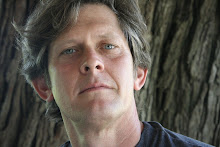
Consider How far we've come.
Just a few short years ago, people who used words like 'green, organic, natural' to describe a better way of life were marginalized and dismissed by most of society, big business, the press, and politicians as if they were a hopeless cult of idealists who "just didn't get it." Conspicuous consumption was pitched as the highest moral paradigm, and Americans bought in - literally. While a few dedicated individuals in the green movement worked tirelessly in the trenches over the 70's, 80's, and 90's, people-turned-consumers were consumed by consumerism.
Now, green is the latest national craze.
"Time to jump on the bandwagon - don't be the last person on your block to go green!" "Look at me, I'm greeeeeeeeeen!!!"
What happened?
Well, to be truthful, gluttonous consumerism caught up with us.
Americans bought big gas-guzzling vehicles, trumped up the price of housing (using the home equity loan like an ATM), and maxed out credit cards to buy things we really could do without. We outsourced everything - even the kitchen sink - under the banner of "globalism." Sprawl was crowned king and McMansions became as ubiquitous as Big Macs.
Now as gas prices head towards $4 a gallon, driving that SUV 60 miles to and from work while your spouse chauffeurs kids through traffic jams from this centralized county school to that far-away soccer field just doesn't look like utopia any more.
For the majority of Americans, its now hitting home (especially the one way out in suburbia or even farther out in exurbia). The financial and cultural strain brought about by a consumption-driven ethic has reached a tipping point. Its not just theory any more; our collective blind eye to the idea of sustainability is affecting people's lives in profoundly negative ways. The cost has been exacted in time, money, and culture. In 2008, the consequences of hyper-consumption are painfully obvious to everybody except the ostriches among us.
(Here's where some of you reading this post can mutter a cathartic "I told you so").
With this realization that "green is good," the business community is taking note.
Automobile companies, who for decades fought against raising gas mileage standards, are now trumpeting hybrid vehicles, even though you can't buy them yet. Developers talk up New Urbanist communities as a green living alternative, although most people can't afford to live in one. Oil and chemical companies are even spinning the PR that the only reason they have ever been in the business is to save the planet. All the while their carbon footprints increase.
Has big business now all of a sudden seen the light? Or is this just a new form of consumerism? Is all the clamor a real sea change, or just "greenwashing" - a term defined by the American Heritage Dictionary as 'the dissemination of misleading information by an organization to conceal its abuse of the environment in order to present a positive public image'?
So what's a nascent green enthusiast to believe? How do we define "green"? How can we know which sustainable options enhance our personal well-being and improve the health of the planet, and which choices are just hype?
I submit to you, the "green ethic."
Over the next few days, we will be discussing the meaning of green. Let's dig deeper than "checklists" and PR campaigns - and hopefully we'll cut through the organic bull droppings. Please feel free to join in on the discussion.





No comments:
Post a Comment